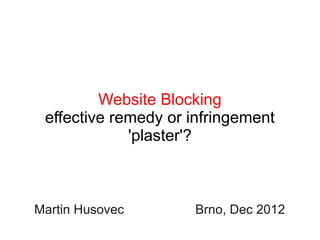
Website Blocking: effective remedy or infringement 'plaster'?
- 1. Website Blocking effective remedy or infringement 'plaster'? Martin Husovec Brno, Dec 2012
- 2. What is a website blocking? Set of techniques by which an internet access provider precludes the circle of its customers from accessing certain website. Currently, the used techniques are: a) DNS blocking = access provider black-lists particular domain name, on which the web-service is based (e.g. 'allofmymp3.com', used in IFPI Denmark v Tele 2); b) IP address blocking (router method) = access provider black-lists IP address used by the server where the website is stored (e.g. 85.112.165.70 for newzbin.com, used to block NewzBin in UK); c) Deep Packet Inspection (DPI) based on URL blocking = access provider blocks specific URLs; necessery as a alternative to router method if targeted service shares IP address, or if only specific parts of the service are to be blocked; (e.g. used to block NewzBin in UK)
- 3. Legal Basis a) preliminary injuctions b) main claim in the proceedings
- 4. 'Intermediary Liability' Based on Union law: “Member States shall also ensure that rightholders are in a position to apply for an injunction against intermediaries whose services are used by a third party to infringe an intellectual property right ..” ● Art. 8(3) InfoSoc, Art. 11 IPRED; Limits Art. 3 IPRED; a) Previous common view: “does not lay down substantial standards, and thus its upon the member state to determine when the intermediary liability is being triggered.” challenged; b) Minimal floor: “the measures concerned must be effective and dissuasive” (§ 136, L'Oreal v. eBay C-324/10); c) Maximal celing: a) fair, b) equitable, c) not unnecessarily complicated, d) not costly, e) do not entail unreasonable time-limits or unwarranted delays, f) effective, g) proportionate, h) dissuasive, i) do not create barriers to legitimate trade, j) are not abusive [Art. 3 IPRED]; ● National law; different concepts; e.g. Störerhaftung (DE); Sec. 97A CDPA + Sec. 37(1) SCA (UK); EMI v UPC (Ireland);
- 5. Scope of 'Intermediary Liability'
- 6. Some Open Legal Issues a) fixed v. open formulated injunctions? b) position of the website operator? c) effectiveness of such injuctions?
- 7. Form of injuctions a) Fixed = naming exact domain name or IP address that has to be blocked ('allofmymp3.com', IFPI Denmark v Tele 2); x mechanism to lift the permanent injuctions? b) Open formulated = identifying the service, but asking to block any future IP address or domain name; These data are: a) then provided by a rightsholder; x review of abuse of the submitted lists; b) or collected by the access provider; x de facto monitoring obligation? x compliant with Art. 15 eCommerce Directive?
- 8. Position of the Website Operator a) How much of the service content has to be illegal? x targeted service = preliminary question to assess; x how much illegality triggers red light? is 30 % enough? x way to stop disruptive innovation online in its early stages? b) Bypassing the Website Operator (WO); x principle “about me without me”; WO can not defend himself as he is not a party of the proceedings; x too relaxed conditions for intermediary liability will favor 'web-block injuctions' over a regular lawsuits against the WO;
- 9. Effective Against: a) website operator can circumvent the measures; b) users can circumvent the measures: - if DNS block, users can use different DNS Server (e.g. Google DNS), - if IP address block - they can use numerous proxy services or VPNs to access the service; In favour: a) althought techniques does not entirely block the targeted services, they make it more difficult for certain group of users; b) this increases transactions costs for the users (e.g. time to search, study and implement technical circumvention, etc.); c) most of the circumvention techniques have to be employed by the end users (so on the demand curve); d) aim is not to erase all infringements from the Internet (imposible), but to keep increasing the transaction costs for obtaining and using illegal content, so it less competitive with the legal substitutes;
- 10. Safe guards ● aim: to prevent inflation & abuse of web-block injuctions; a) ultima ratio solution = rightholder should prove he exhausted less intrusive or/and more effective instruments; ('transport chain': 1) website operator, 2) his hosting provider, 3) his domain name holder, 4) access provider, 5) domain name authority, etc.; b) proper legality review = examination of the website business model, its separation from the underlying technology (innovation); Provement of - some proportion of legal use (should be addressed differently in different stages of disputed innovation); x de minimis legal use not enough (§ 186 Newzbin2); x substantial proportion of non-infringing content (§ 201 Newzbin2); c) website operator defense = WO shall have a possibility to legally challenge the block order, either ex post or in proceedings;
- 11. Court of Justice of EU UPC Telekaben Wien C-314/12
- 12. Thank you for your attention! [http://husovec.eu] martin@husovec.eu
